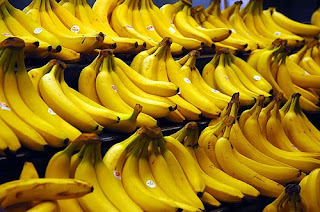CC photo from Steve Hopson on Flickr.
Farmers, restaurants and supermarkets throw away millions of tons of edible food each year at a time when a growing number of Californians struggle to put food on the table.The above figures come from a partisan source, but no one is disputing the fact that grocery stores throw away a lot of expired food.
State studies have found that more than six million tons of food products are dumped annually, enough to fill the Staples Center in Los Angeles 35 times over. Food is the largest single source of waste in California, making up 15.5 percent of the Golden State’s waste stream, according to the California Integrated Waste Management Board.
But is the waste bad? How could stores be set up to never waste perishable foods?
If stores and farmers could perfectly predict demand from week to week far ahead of time, there would be no waste. One week, customers at a given store would want 213 bunches of bananas, and that store would have stocked exactly 213. Obviously, this is not realistic. And even with omniscient grocery stores, consumers would still do a fair bit of throwing away themselves.
Another way would be to limit supply to the bare minimum. Suppose that demand for bananas at a given grocery store fluctuated between 120 and 300 bunches of bananas each week. To never throw away a rotten banana, the store would stock only 120 bunches each week.
If only one store in an area did this, the store would forgo many profitable sales, as its banana-spurned customers shopped elsewhere. If all stores in the area did this, the price of bananas would skyrocket. In either case, farmers and stores would have every incentive to increase production and therefore make more money. Depending on the underlying distribution of weekly banana demand, perhaps our hypothetical store should stock 250 bunches a week. Sometimes demand will fall short and bananas will go bad, but the strategy will be more profitable and consumers will be better off.
As it is now, the grocery store can change prices to help equate supply and demand. If the store has a batch of bananas about to expire, suddenly there's a sale on bananas. However, bananas are already extremely cheap, so customers are only sensitive to price changes up to a point. Eventually, it's cheaper to throw bananas away than to sell them for a penny (or even for negative prices; i.e., paying customers to take them). And there's nothing wrong with that, because the store tolerates a few rotten bananas in some weeks for higher profits in other weeks.

No comments:
Post a Comment